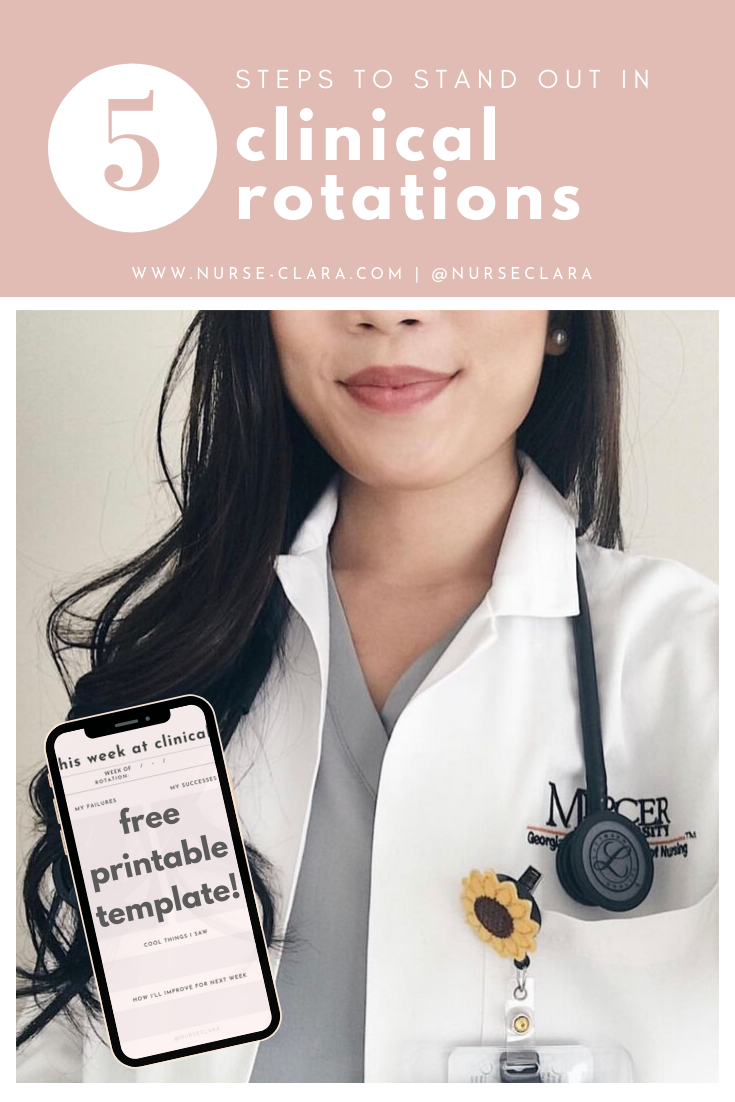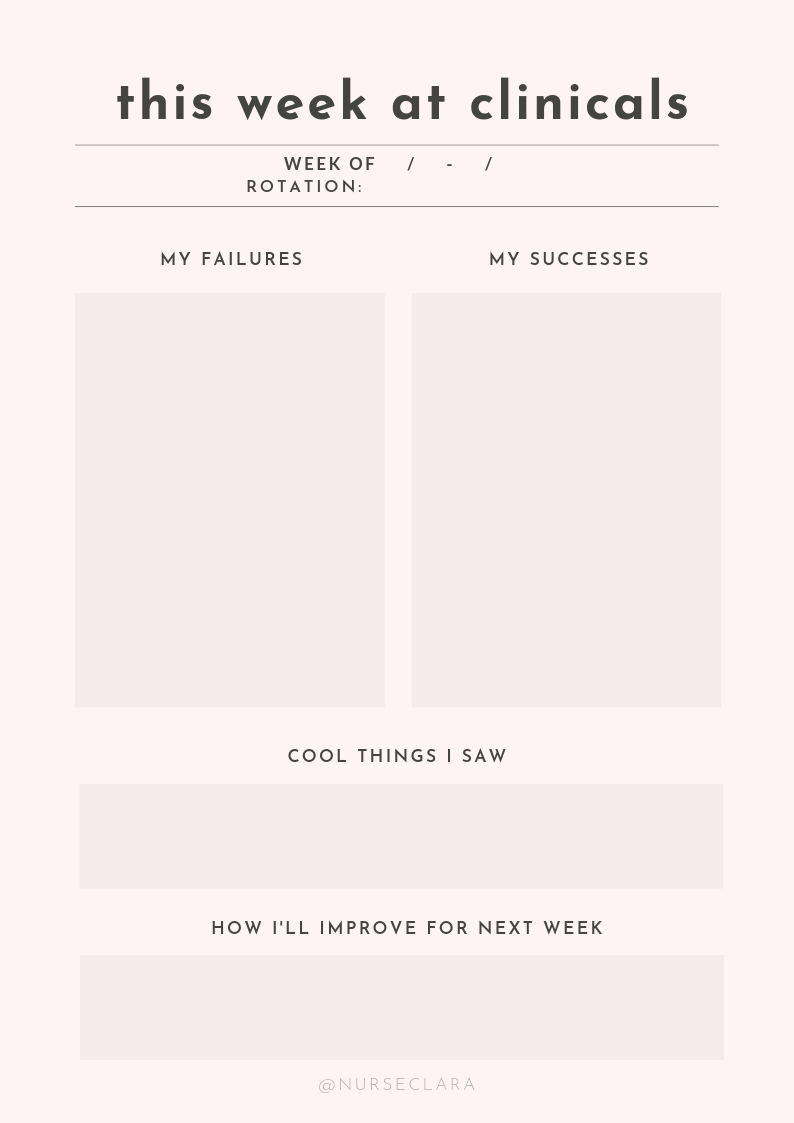5 Steps to Stand Out in Clinical Rotations
Clinicals can be so terrifying, girrrrrl do I know it. It’s the first time most of us are dealing with real-life patients with real problems and they actually talk back to us, unlike our practice mannequins. You want to learn as much as you can without annoying the nurse you’re assigned to, not be terrified the whole time, ask the right questions, and not kill anyone! You’re not alone in these thoughts. If you want to stand out in clinicals… keep reading!
My first clinical rotation was in the first semester of nursing school. It was on a general medicine floor, otherwise known as MedSurg. My first “assignment” was 6 patients with a nurse. I had never actually given/received an SBAR report before, given any meds, consulted with physicians, delegated to techs, or literally anything we talked about in that first semester of nursing school. But here I was.
I was so terrified.
What if I made a stupid mistake and killed someone, somehow?
What if the nurse that I’m working with hates me?
What if this is when I learn that I’m terrible at the clinical portion and need to drop out?
What if my patients hate me?
What if they know I’m clueless?
And again, what if my nurse hates me!?
If you’re thinking these things… you’re not alone. And that’s okay! I’ve learned that these are very common questions that we all have when we’re first thrown into the clinical setting. For the first couple of weeks and months of nursing school, we’re taught the very general clinical presentations of illnesses, generic treatment of those illnesses, and so many meds our brains just may explode. I had even failed my first foley insertion so that didn’t help my confidence - AT ALL. So how am I supposed to survive, or even stand out in clinicals!?
Confide in your clinical instructor and let him/her know the things you are comfortable doing, and the things that you want to learn.
For me, I wanted to excel in communicating with my patients so that they would be comfortable. I’ve had retail experience but have never really interacted with patients. I was comfortable with the computer system and handing out meds, but I had no idea how to manage my time and prioritize my tasks because hello?? We’ve never done this before!
But that first thing was key. Not only did it help my clinical instructor know what to help me with, it helped me learn my boundaries and weaknesses so that I knew exactly where to grow. We joked that we start every patient encounter with, “Hi Mr.Mrs ____, I’m Clara and I’ll be your student nurse today!”
Doing this eases the pressure that you put on yourself to know things you aren’t expected to know, because you don’t need to know everything. That’s not the point. The point is to be open and eager to learn and be uncomfortable, so that you can grow! It’s not going to be easy, but as long as you are honest with yourself first and foremost, and then with your clinical instructor, the easier it will be to be honest with the nurse you’re learning from and furthermore, with your patients.
Recap your week.
This included all the difference illnesses I saw, new meds I saw in clinical, new procedures I saw, etc. But the 2 most important things I made sure to recap each week were:
1. My failures
2. My successes
Why? When you can see where you failed, you know where to improve. And when you see where you succeeded, you affirm your abilities. And it doesn’t have to be complicated. It doesn’t have to be Instagram worthy or blog worthy, but if you do want to make it fun, I made a free printable weekly clinical template for you below!
See, when you’re able to visualize your strengths and weaknesses, it becomes way less stressful and overwhelming. This way, you can write out a step by step plan on how to get to where you want to be. It is also nice to look back at what you once thought was impossible and see that you did indeed get through it! I highly recommend making these lists so that you’re able to keep track of your progress in clinical.
enter your email below to get your weekly clinical template!
Be prepared.
This one should be a no brainer, and I’m sure your nursing program stresses this, too. It’s simple: Don’t forget your paperwork. Have extra pens. Have your stethoscope handy. Have extra snacks. Be the good nurse with the scissors. These are the things you can control, so make it right. In the clinical setting, you’ll find that there is so much out of your control. You don’t know how your patient will react to a med they’ve never had before. You can’t predict what their morning labs will show. You can’t control these things. But you can control the things on your part so that it’s 1 less thing to worry about.
This all being said, remember that you’re not perfect. It’s not a big deal if you forget a hair tie. Use a rubber band. It’s okay if you forget a black pen. It’s okay if you forgot your water bottle. These menial things aren’t the end all be all. But creating good habits of being prepared will help you in the long run. Each night before clinical, pack your bag and make sure you have everything you’ll need, so that in the early mornings, you don’t have to scramble and risk forgetting something. I still do this as a nurse, and I’m so glad that I started this habit early on.
Ask questions!
I cannot stress this enough! I was always told that no question is a dumb question. And whether you believe that’s true or not, it doesn’t matter. Ask the question. Put your pride or embarrassment aside. You’re not in nursing school to sit idle and nod yes. You’re in nursing school because you’re learning to take care of people at their most vulnerable state. By asking questions, not only are you advocating for yourself, but an advocate for your patients! They need you to ask these questions. They need you to care enough to dig deeper and ask the questions that other nurses and nursing students may not ask.
These questions that you ask can be as simple as, “Where can I find the hospital’s policy on range orders?” or “How often do I need to assess my patient?” And not every question needs to be clinical. It can be asking the charge nurse, “How do you make patient assignments for nurses? What are the opportunities on this unit that I should be taking advantage of during my time here?”
The time will pass anyway. Make the most of it!
It’s no doubt that there is at least 1 rotation you’re just not looking forward to. At all. And I get that. I wanted nothing more than to stay home when it came to psych rotations. I was dreading it soooooo badly. I knew I didn’t want to pursue psych nursing, so why do I have to endure the clinical rotation for it? It made no sense to me. But listen.
1. The time will pass anyway. Whether you’re miserable and hate your life the whole time, or you make light of it and challenge yourself to learn something!
2. You’re paying for this. Don’t you want to get something out of it?
3. You may be surprised. With each clinical rotation, I learned that it’s not what I expected. Whether it be oncology, ICU, palliative care, psych, geriatrics, OB, peds- nothing was what I expected. Who knows? Maybe you’ll find that you enjoy it! Or maybe you were right and you aren’t meant to pursue this specific specialty. But it’s an experience no matter what.
I hope this tips help you stand out at clinical! And as always, if you have any questions, comment them below, DM me on Instagram at @NurseClara, or email me via the contact form in the About page!
xo,
Clara


